Mark Allen
53, lecturer, Boston University London Program, on January 8, 2014.
Allen worked with American study abroad students—mostly from BU—for more than 25 years. He taught British literature in the BU Oxford Honors Study Program from 1986 until the program was closed in 2008. He had been teaching in BU’s London Program since 1996 and was the coordinator and lead lecturer for the literature track of the recently created English history and literature program.
A popular and gifted lecturer, Allen had a passion for his subject, a sense of humor, and a sincere interest in his students, who never doubted that their opinions mattered, even as they were challenged to think beyond their comfort level.
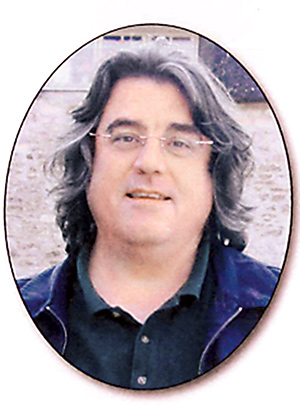
Mark Allen
Allen earned an MA in English literature from Mansfield College, Oxford. He tutored in several Oxford University colleges and held a lecturing post at St. Edmund Hall, Oxford. He also spent two years teaching in Italy and lectured at the University of Venice. He published reviews and articles on Romanticism in several academic journals and also worked for the Oxford English Dictionary as a historical reader specializing in the works of Coleridge.
The following appreciation was written by Dee Mondschein (CAS’97), who studied under Allen during a study abroad semester in London. The two remained friends until Allen’s death.
I had the privilege of knowing Mark Allen, first as a student in Boston University’s Study Abroad program at Oxford and then as a friend when I went back to Oxford to read for a Master of Philosophy. I then moved to London to work on the Spectator magazine and lived there for another five years or so. I visited with him when I made trips to Oxford. When I moved back to New York, we stayed in touch through long and lively emails, and I saw him every time I went to England. He connected with so many students, and the academic world will be the lesser for his passing.
He was an erudite scholar and a gifted teacher. For many students on the program, it was their first experience with a teacher as a real person. Oxford is different from American universities: a student can have a drink with tutors (what we in America would call professors) and can call them by their first names. Mark often took us all out for drinks at the Lamb & Flag. He’d sit at the head of the tables we’d pushed together and ask us questions. He was genuinely interested in learning from us—about America and Americans. And by teaching so many of us, he’d picked up the lingo. (It was funny to hear him say, “Dammit!”)
But make no mistake, when it was time for class, we had better come prepared. Mark pushed us. He made us read Ulysses aloud, one at a time, going around the room. It made such a difference to hear it, to experience how difficult it was, and to get it into our heads. This not only ensured that we learned from him, but that we learned from each other. We felt as though we were a part of our own education and that he wasn’t teaching at us. This is something foreign to our American understanding of teaching.
Mark was aware that this was an experience for us. And he loved watching us learn and grow. It was comfortable, friendly, and profound all at the same time. He was as excited about what he was teaching as if it were his first year. BU could not have picked a better ambassador.
One morning there was a power outage at Oxford’s St. Anne’s College, where our classes were held. Others might have called a day off, but Mark walked from Jericho, the area where he lived, to the student house on Crick Road. We all came downstairs to the common room (some still in our pajamas) and he taught a class on T. S. Eliot. He didn’t want to miss a class; he was excited to teach it and discuss it. We realized that he was more than just a tutor and that his course meant more to him than just lecturing. His deep and profound knowledge of Eliot’s The Waste Land, for example, seemed to send students back to Boston University with a desire to “work for distinction” with Christopher Ricks, BU’s William M. and Sara B. Warren Professor of the Humanities. They came back to Boston all the better because of him.
One could tell he enjoyed having other people around him, and his character was a fine mix of British joviality and black humor, which came naturally to him. BU students will remember a big guy with long dark hair and wire-rimmed glasses who was proud of his Northern upbringing. They will remember his intellect, his amiable nature, and his ready smile.
I remember telling him once that the poet William Blake scared me. He smiled approvingly: “He bloody well should.” And, after a silent pause while he watched it sink in, he finished with his characteristic reaction, which all who knew him would recognize: “Bmph.”
Donald Freeman Brown
105, a College of Arts & Sciences professor emeritus of anthropology and archaeology, on February 21, 2014.
Brown earned an AB in 1930 from Harvard College, where he continued to work and study for the next decade. He served in the Army, in Italy, during World War II.
He married artist Linda Easton Smith in 1948. A year later he returned to Italy with Linda to research Neolithic ruins for his PhD thesis and to search for the lost city of Sybaris, a sixth-century BC Greek colony in southern Italy.
A 2011 profile of Brown in the Harvard Gazette described the root of his fascination: “As a boy in Springfield, Mass., he was drawn to tales of the lost continent of Atlantis….But true epiphany came when the young Brown read about the dancing horses of Sybaris in James Baldwin’s 1911 classic The Wonder-Book of Horses.” After extensive research, Brown discovered the colony, thanks to a technique he pioneered for surveying large archaeological sites, called creative core boring. The technique revealed the pottery of Sybaris—the first evidence and proof of the existence of the lost Greek colony.
In 1952 and 1953, Brown won the Rome Prize, becoming a fellow in classical studies and archaeology at the American Academy in Rome.
In 1955, he returned to Harvard, where he earned a PhD in archaeology and became editor in chief of the Council for Old World Archaeology. He was also assistant curator at Harvard University’s Peabody Museum. He left Harvard in 1965 to accept a professorship at BU, where he cofounded the anthropology department. He retired in 1976.
Brown had a lifelong passion for classical music, and as a student, played the cello and sang in the Harvard Glee Club. At age 70, he joined the Stow Chorus, in Stow, Mass., singing with the group for several decades. He also enjoyed attending Harvard University commencements. The 2011 Gazette profile described Brown’s appearance at graduation that year: “a modest black suit, a Harvard tie, and a ball cap with the legend ‘My life is in ruins.’”
Carol Lechthaler Hills (COM’49)
88, a College of Communication professor emerita of public relations, on July 3, 2012.
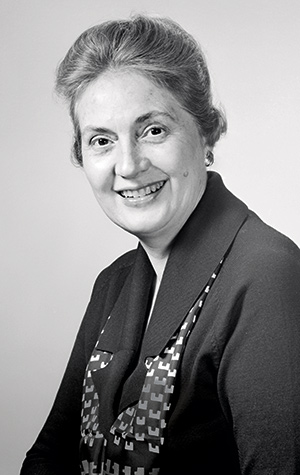
Carol Lechthaler Hills. Photo by BU Photography
Hills earned a bachelor’s degree from Tufts University in 1947. Two years later, she was among the first class of students to earn a master’s in public relations from BU. She joined the faculty shortly after, becoming one of the first female professors at the University.
“She had many professional contacts in the industry, and she was a great organizer,” says Otto Lerbinger (COM’44), a COM professor emeritus of public relations. “People in the public relations industry thought very highly of her.”
When public relations emerged as an industry, it was largely focused on corporate work. But Hills specialized in PR for nonprofit organizations. She created classes to teach students how to fund-raise for local nonprofits as well as for international nongovernmental organizations. She started an internship program for graduate students to do PR work for nonprofit clients for a semester, a program she later expanded to undergraduates.
She was known at COM for giving PR students all the tools and resources they would need to succeed in the industry. She would often organize trips for her graduate students to public relations forums in New York, and she would bring the world’s leading PR experts to BU’s campus for special seminars.
“She was always a cordial colleague,” says Gerald Powers (COM’56), a COM professor emeritus of public relations. “She related particularly well to the graduate students. She was sort of a den mother to them.”
During the 1990s, Hills created a course in international public relations, which Lerbinger says was one of the first in the country. “Since then,” he says, “whole books have been published on international public relations.”
She retired in 1995, and that year received a COM Alumni Award. She helped raise more than $1 million to create the Harold Burson Professor and Chair in Public Relations, the first academic faculty chair endowed at the College of Communication. It is currently held by Donald K. Wright.
Outside of BU, Hills developed and taught a course on public relations at the US Navy War College in Rhode Island and served on the board of trustees at the University of New England for several years. She was also a fellow of the Public Relations Society of America.
“She was one of the originals,” says Lerbinger, who was the inaugural Harold Burson Professor and Chair in Public Relations. “She really placed public relations education on the map.” Madeline Rosenberger (CAS’14, COM’14)
Robert Watts Thornburg
86, dean emeritus of Marsh Chapel and a School of Theology professor emeritus, on December 29, 2013.

Robert Watts Thornburg. Photo by BU Photography
Thornburg held weekly teas open to anyone who wanted to come and an annual dinner for the University’s buildings and grounds crew. He and his wife, Ann, threw an annual community Thanksgiving dinner for those who didn’t have a place to go—international students, faculty members without families, or students who couldn’t get home for the holiday. And, recalls former Marsh Chapel music director Julian Wachner (CFA’91,’96), a friend of Thornburg’s, his Sunday sermons at Marsh Chapel were broadcast on WBUR, BU’s NPR radio station, allowing his voice to travel around Boston and beyond.
Thornburg, says Wachner, “wasn’t just the voice of the chapel, or of the University, he was its soul, too.”
“Bob was a caring and loving pastor to the BU community,” says Rev. Robert A. Hill, current dean of Marsh Chapel. “He was known for his happy heart and generosity of spirit.”
He earned a bachelor’s degree from DePauw University and did graduate work at Garrett Theological Seminary at Northwestern University and at Union Seminary at Columbia University. He received honorary doctorates from DePauw and Illinois Wesleyan University.
He became an ordained United Methodist Church minister and served parishes in Chicago, Northbrook, and Peoria, Illinois. He later became the associate general secretary of the United Methodist Church Board of Higher Education and Ministry. In the 1960s and 1970s, Thornburg fought for human and civil rights and was chair of the Human Rights Commission in Peoria. He was well known nationwide for his studies on destructive religious cults.
Thornburg’s career at BU spanned 23 years. Many of the University’s most successful programs, such as the Inner Strength Gospel Choir and the Martin Luther King, Jr., Day celebration, were established under his guidance. He kept in touch with dozens of the children he baptized, students whose weddings he officiated at, and families of those he performed funerals for. He turned Marsh Chapel into not only a place of communal worship, but an incubator for student ideas.
“He lived a combination of deep personal faith and active social involvement,” says Hill.
Known for his sense of humor, love of cooking, passion for music, and joyful personality, Thornburg devoted his time to assisting others in whatever way he could. Former students recall that he was a source of inspiration and that he always knew exactly what to say. He cheered on the men’s basketball team at every home game, and he sometimes traveled with them.
BU inducted him into Phi Beta Kappa and awarded him a Scarlet Key, and the basketball team honored him with a Thornburg 1 jersey for his longstanding support.
He was a man of compassion who cared for the BU community even after leaving BU. Hill remembers a telephone call from the former dean after the Boston Marathon bombings, expressing his condolences on the death of Lu Lingzi (GRS’13) and offering to help the University in its efforts to deal with the disaster. “It was so relieving to hear his voice,” says Hill. “He told me he knew this was a difficult time for the spiritual community in Boston, and he wanted to express his sympathy.” MR

































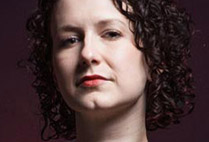














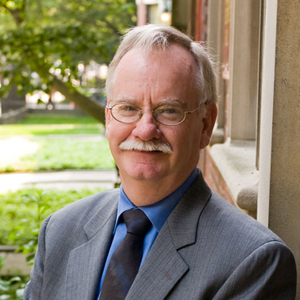

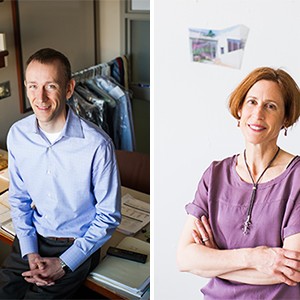
I am deeply saddened to hear of the death of my friend Bob Thornburg. I was a freshman in 1978, the same year he arrived at Marsh Chapel, and was a member of his first student steering committee. Bob was a mentor, and became a lifelong friend, inviting me to stay with him whenever I visited Boston. I am sure I am one of hundreds, perhaps thousands, of alumni on whose lives he made a profound and positive impact. He was one of the best things about BU, and one of the best pastors and preachers I have known in my 54 years. He will be greatly missed.
The obituary notice for Mark Allen caught my attention, not because I was a 1989 participant in the BU Oxford Honors Study Program (CLA ’90), but because of the heartfelt addendum by Dee Mondschein (CAS ’97).
Mark was not one of my tutors (I read the Politics and History modules), but Dee’s description of the tutorial system brought back fond memories of my own Oxford experience.
It is gentlemen like Mark who bring life to one’s scholastic journey. It was comforting to read one of his student’s accounts, and surely he had a positive impact on many more. May Mark Allen be remembered thus.